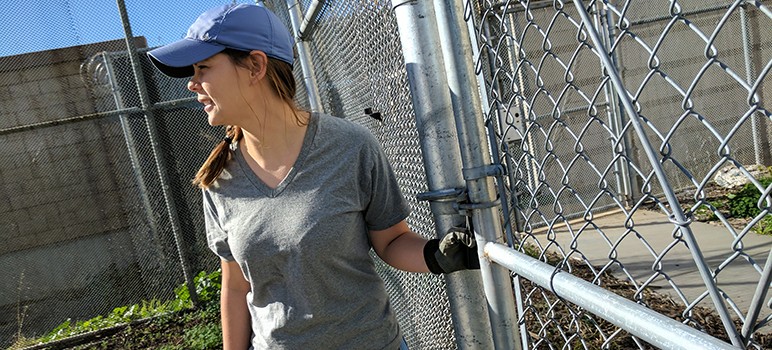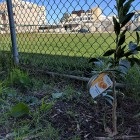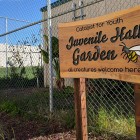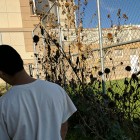In the corner of a fenced-off garden surrounded by surveillance cameras, Jake writes the first New Year’s resolution of his young life.
“Attend college,” he scrawls in black Sharpie on a Post-It note. Jake, whose given name is being withheld because he’s a juvenile detainee, says a satellite course he completed through Evergreen Valley College at Santa Clara County Juvenile Hall piqued his fascination with history, writing and understanding how the world works. After rolling his note into a tiny cylinder, he selects a clay pot, buries his goal into the soil and tops it off with a red-tinted succulent.
“That’s a good one,” says Zia MacWilliams, his group volunteer mentor. “Who’s next? Think about something that you want to accomplish—anything meaningful, it doesn’t have to be big.”
Jake’s peers, four other boys in yellowed-white T-shirts, khaki pants and chunky Velcro shoes, crouch down to follow suit. “Make this garden thrive,” one writes. “Get a job,” another note reads. The rest pick variations on a theme: “Stay out of trouble.” Then, one by one, they leave their resolutions burrowed inside a row of brightly colored terra cotta planters in a sunlit patch of garden.
For wards of the court accused of serious crimes and facing an uncertain future, these goals take on profound significance. As does their afternoon in the open air, a rare chance to spend time in nature—even if it is a small, enclosed patch of it.
“They spend most of their time inside,” MacWilliams says, motioning toward the detention facility, a fortress-like block of concrete blocks and slit windows off of Hedding Street in San Jose. “Being able to be out here is a privilege.”
Since spring of 2016, MacWilliams has taught teens locked up in maximum-security units how to tend the once-neglected swath of herbs, vegetables and citrus saplings. San Jose Inside—on condition of protecting the identities of the juvenile detainees—was granted a rare look inside the garden, which is sprouting with lettuce, beans, mint and a variety of other winter crops.
Armed with a $5,000 Knight Foundation grant and a rotating cast of volunteers, she spends several hours just about every other weekend at the verdant plot with youthful offenders. By doing the work themselves, the detainees learn how to plant and cover crops, how to cook with fresh produce, how to fertilize and prune, how to keep the soil alive with plant-feeding nutrients. Veggielution, which runs a nonprofit urban farm in San Jose’s East Side, and Bay Maples, a business that specializes in drought-tolerant landscaping, have donated time and materials for the effort.
“These are life skills they can actually use,” MacWilliams says. “There’s also a therapeutic element, being responsible for taking care of something that’s alive.”
For a county that has spent the past several years trying to reduce recidivism in the juvenile justice system, the gardening sessions are a welcome addition to the agency’s curriculum. It also ties into an approach adopted by the county more than a decade ago to build pro-social interaction between staff and juveniles in their care. Called positive youth development, the strategy favors rehabilitation over retribution and has resulted in dramatically lower rates of recidivism. Any activity that translates into even slight improvement can have profound implications, helping advocates make a stronger case for juvenile detainees who get involved in the program.
“We can write them letters that could help the outcome of their case,” MacWilliams says. “Because we spend all this time here, we actually get to know them.”
County officials have discussed folding the gardening into existing vocational training, which includes food prep and safety certification. Already, the kids who volunteer in the garden have used their crops to prepare meals, including salsa and veggie wraps. This year, MacWilliams hopes to renew her grant funding and strike up a partnership with local university campuses to serve fresh food at their cafeterias or donate some to Second Harvest Food Bank, which serves Santa Clara and San Mateo counties.
“The way I envision it is having a sign or something that says how this food came from Juvenile Hall,” she says. “So when people eat it, they can think about where it came from and the kids who grew it.”
As the garden fosters connections to the outside, it has increasingly become a source of solace for teens locked into an extremely regimented existence.
“When my family comes, I tell them about what I planted,” says Isaac, whose name is also withheld by request. “I think it surprised them at first.”
Gina Lee, a Veggielution volunteer who lends her expertise to the project, says she loves seeing the young people so receptive to her guidance.
“They’re really curious,” she says.
Initially, Lee admits, she had her reservations about interacting one-on-one with detainees, some of whom have been accused of capital crimes. MacWilliams says she felt the same way at first.
“I was afraid when I started this,” she says. “I wasn’t sure I would be safe or what kind of a difference I could possibly yield. After my first visit, I realized that these are people, too. People who love to learn and work with the earth.”
Some of the youth will get to ply their new skills outside in the near future and show their families what they’ve learned. Others, Jake included, will have to wait many more years for the chance. Still, he says, learning how to grow and prepare food is one of many skills he’s worked on acquiring this past year as his case wends its way through court. Two weeks before planting his 2017 resolution in that vibrantly painted clay planter, he earned his high school diploma—a feat he once considered beyond reach.
“The ceremony was crazy,” he says, taking a break from pulling weeds. “It was like getting married. I had a gown on and everything.”
“Did you throw your cap up in the air?” MacWilliams asks.
“No, but I gave a speech,” Jake replies. “I put a poem in there, too. My message was to try to get everyone else in my unit to graduate and get their diploma. They say this is a bad place, but we have to take advantage of our time here, [not] sit here and do nothing.”
In prison, he says, he would have far fewer chances to educate himself.
“Hopefully I don’t go there,” Jake says, wiping sweat off his neck with his T-shirt. “Even though I have a record and stuff, I want to at least have something good to work on.”
- A citrus tree planted by youth incarcerated at Santa Clara County’s Juvenile Hall. (Photo by Jennifer Wadsworth)
- Juvenile Hall detainees helped assemble a new sign for their garden. (Photo by Jennifer Wadsworth)
- On a recent winter afternoon, some of the incarcerated youth wrote their goals for the new year on a piece of paper that they buried beneath potted succulents. (Photo by Jennifer Wadsworth)
- A juvenile detainee taking a San Jose Inside reporter on a tour of the garden. (Photo by Jennifer Wadsworth)






Kudos to the community volunteers and the Juvenile Hall staff and managers who are making this rehabilitative program work.
I trust these youngsters are, as are their peers on the outside, made aware every time a young plant growing in the U.S. is insufficiently watered, roughly handled, disastrously over fertilized, intentionally uprooted, or otherwise rumored abused. That way these young gardeners can personalize every rumor or isolated misdeed and use them as an excuse to neglect their own plants, sow the seeds of resentment, and nurture perennial grudges. After all, we wouldn’t want them to tend their gardens with their own best interests in mind, would we?
I remember when “history”, not “social studies”, “writing”, though I was never very good at it, and what we used to call “science” the study of how things work was taught in schools.
We had class projects like growing beans and sunflower seed in a jar. Grafting branches of different fruit trees, and raising guppies and different colored mice to study genes and evolution.
Today those are called GMO’s and are “Franken Science” our kids are taught that only “illegal aliens” should work on farms, “social studies” not history is about how America is a terribly racist country run by dead white men.
Maybe we could go back to educating our kids about the real world before they end up in jail learning about it the hard way. But I suppose that’s not very progressive.
I think a big part of the problem is the lawyer contingent. Any employer who hires an ex-felon (or even someone who served time for a misdemeanor) takes a big chance. If that ex-con commits a crime, the victim would surely go after the business too (because the employer has the “deep pockets”, see?)
A possible solution (off the top of my head):
The Legislature could pass a law protecting employers from civil suits, providing that:
• The ex-con has served his/her time
• Has made restitution
• Has lived a crime-free life for the past, say, three years, and
• Provides a way to expunge their criminal record
(I understand that they can have their record expunged now, but it requires jumping thru flaming hoops to get, for example, a conviction for strong armed robbery with personal harm expunged. And if the victim objects, it’s very difficult). A law providing a clear and reasonably attainable pathway for re-entering mainstream society would do the job. Meet some reasonable requirements like those above, and expunging their record would be automatic upon completion.
Lots of young people made an (admittedly big) misteak, and ended up with a criminal record. Their only options available now are self-employment, the military (if it will take them), or in most cases, living off the dole — with the constant temptation to once again engage in criminal activity because the payoff is so tempting and immediate. And of course, being on the dole doesn’t provide any ladder to climb; there’s no chance of becoming the ‘VP of Welfare’ with a corner office and a six-figure income.
This permanently unemployed class grows year over year because what employer will hire them? Saul Alinsky would be excited and proud. (Alinsky’s stated goal in overthrowing America was to get as many people on the dole as possible.) In the past, they could move to another state and start over. But now, with law enforcement and the internet…
If employers had some sort of legal protection, they would have a big pool of otherwise competent individuals to hire from. Unemployment would go down, and the new hires would start paying taxes instead of living off taxes. Many if not most of them would become productive working members of society, embellishing stories for their grandkids about their nefarious past criminal activity. That’s surely better than the alternative, no?
No doubt the lawyer lobby would squeal like stuck pigs—and what group squeals better than them? (JMO excepted☺) But America has always been the land of second chances. That’s one of the great things about our country.
We’re not much different from Australia, which was populated largely by convicts. America was populated by the same kind of people, and even if they weren’t exactly convicted criminals, plenty of them were on the run. But with the internet, where can they run to now? The nearest welfare office?
IMHO we as a society should provide them with a second chance; surely for first time offenders, at least. Because what good is ‘rehabilitation’ if you can’t get a decent job?
Getting a decent job with a clean record and a thin resume is hard enough. I can’t imagine finding any kind of meaningful, beyond subsistence job with a criminal record.
Certainly, it would be sensible for the legislature and criminal justice system to provide some kind of accommodation and support to job seekers and would be employers, but I have no idea what that would be.